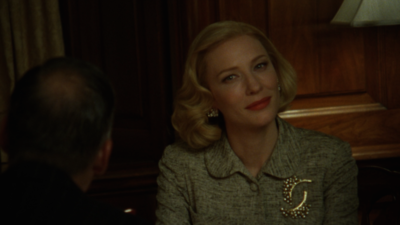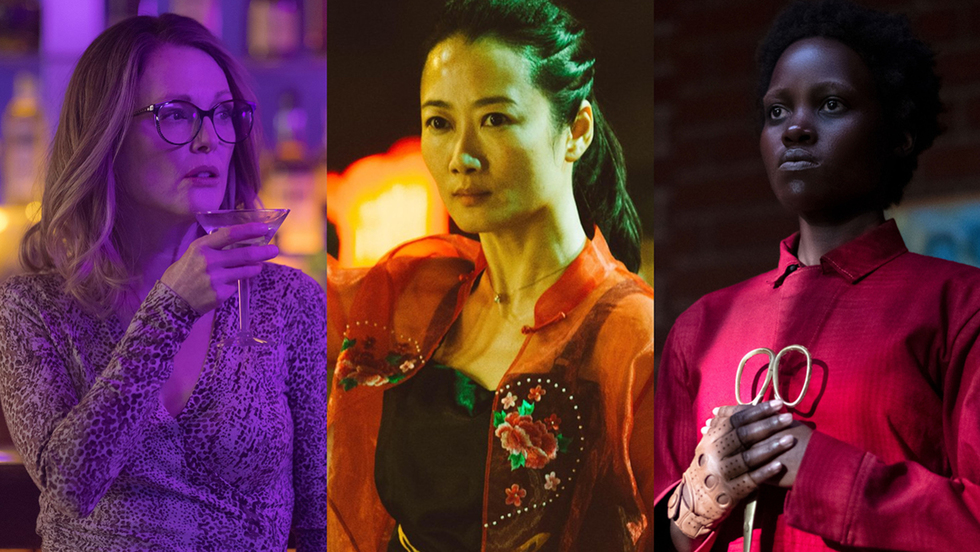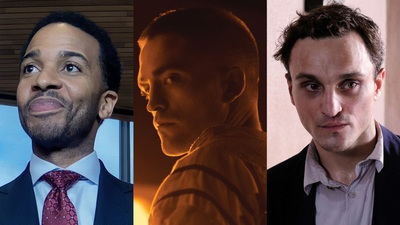
BY MATTHEW ENG |
The 12 Best Female Film Performances of Early 2019
These screen performances may have debuted during the first half of 2019 but their achievements deserve to be discussed and remembered all year round.

Contrary to what the Academy’s usual group of 20 acting nominees might tell you, great film performances can be found in any month of any given year. So much so that if the Academy instituted an eligibility cutoff right now and filled its Best Actress roster with any of the lead performances cited on this list, it would still be a remarkable and superior year for this first-class category.
The performances on this list have been delivered in films as disparate as a rollicking musical drama, a horror movie in which the unspoken political implications chill the spine almost nearly as much as the images on screen, and a subdued character study about the sort of American woman who is rarely made the focus of American movies. If these performances share anything in common it is that, like the best screen acting, they have lingered in the mind of moviegoers long after the cinematic experience has come to an end.
Without further ado, here are 12 of the best female film performances of 2019:


Jessie Buckley and Julie Walters, Wild Rose
Sometimes a performer lights up the screen so intensely that the phosphorescent glow of her innate talent is more than enough to make a familiar story worth retelling. As Rose-Lynn Harlan, a Glasgow country singer bent on getting to Nashville, Jessie Buckley occupies the center of Tom Harper’s Wild Rose and delivers a star turn so joy-inducing, eye-catching, and heart-searching, that it is practically serves as a one-woman tonic. Newly sprung from prison for a drug conviction, Rose-Lynn tears into life like a category-five hurricane; she’s drawn to trouble, quick to offend, and ready on a whim to pummel adversaries twice her size. She carries a discernible chip on her shoulder, struggling to balance her artistic ambitions with her responsibilities as a day-cleaner to a bored housewife (Sophie Okonedo), who will take a pivotal interest in Rose-Lynn, and a parent to two young children, borne before the age of 18, who were previously under the guardianship of grandma Marion (Julie Walters) during Rose-Lynn’s incarceration.
The movies are no stranger to musical dreamers and penitent mothers, but the specificity of screenwriter Nicole Taylor’s conception of the character and Buckley’s restorative ingenuity make Rose-Lynn feel like an utterly fresh discovery. The actress is fortunate enough to be in a film that never boils her arc down to self-help bromides or facile displays of redemption, but the film is even luckier to have Buckley, a surprising and completely authentic emoter who possesses a stupendous, full-throated singing voice. She gives her standout musical performances an exuberant, humorous, and refreshingly un-self-serious energy and enlivens her dialogue scenes with spontaneous gestures—like burying her teary eyes in her fists at an unexpected piece of good news—that could only resonate from a performer who has fully inhabited her character from the inside-out. Her genuineness makes Wild Rose into the rare crowdpleaser that feels so good because it feels so real.
As Rose-Lynn’s mother Marion, a tough-minded woman eager to love and relate to her daughter but scared of being disappointed yet again, Walters contributes one of the year’s superlative supporting performances. A Dame frequently directed to go broad and fussy, Walters reminds us here that she can be a magnificent underplayer by shading Marion’s sobriety with palpable traces of tenderness. When the character’s pique manifests in brief bursts, Walters modulates her understatement to suggest the long-running history of mother-daughter discord from which this pain originates. Her face, brimming with a deep, wishful affection that Marion is far too cautious to proffer, is the lodestar that Rose-Lynn and the film cannot help but return to for succor and fortitude.

Julianne Moore, Gloria Bell
There was a time in American movies when watching a film with Julianne Moore would inevitably set a new criterion in the art of screen acting. In Safe, Boogie Nights, and Far From Heaven, this peerless actress delivered technically virtuosic turns, her overt yet accessible stylization located right at the juncture where the artifice of moviemaking met the psychological unease of daily life. Moore is a different performer today, one admittedly more interested in naturalism than calculated craftsmanship, showing us life as actually lived as opposed to creating distinctive characters who continually confound our expectations. There have certainly been returns to this particular form—her feverish take on a callous Hollywood has-been in Maps to the Stars was a recent highlight—but to watch Moore on screen now in something like Sebastián Lelio’s Gloria Bell is to witness an artist so relaxed and self-effacing in the eye of the camera that the line between actor and character all but dissolves. Moore appears in every scene and nearly every shot of Lelio’s remake of his 2013 Chilean drama as a divorcée searching for one loyal love in the middle-aged L.A. dating scene. To say that Moore “leads” the movie is disingenuous; she is the movie. Her subtlety, flourishing in long, static shots in which Gloria’s feelings spring to the surface and play out effortlessly and authentically across Moore’s open face, sets the piece’s muted emotional temperature, making this retread inconceivable without her involvement. Moore secures our attention and empathy the first time we lay eyes on Gloria, unaccompanied and cradling a cocktail in a noisy, crowded disco, her quiet yet receptive watchfulness communicating an eagerness not merely to be seen but known. The actress is lantern and flame, a vessel through which hope, longing, and the inner light that is both Gloria’s and Moore’s consummately glows.


Elisabeth Moss and Agyness Deyn, Her Smell
At a time when modest, unshowy naturalism has become the prevailing standard in American screen acting, it takes plenty of gumption, ceaseless commitment, and considerable skill for a performer to experiment with heightened affectation like Elisabeth Moss does throughout Alex Ross Perry’s Her Smell. As Becky Something, the self-absorbed and rapidly self-annihilating frontwoman of a ‘90s punk rock band, Moss, one of the greatest and gamest actors working today, is unintimidated by the daunting task laid out before her: vivifying a downward spiral, a rock bottom, and a rise towards redemption in a genre by now prone to all sorts of clichés. Without descending into hamminess, Moss performs like she is unafraid to be caught acting, a decision completely in tune with a character who is herself a shameless exhibitionist. The actress illustrates Becky’s unnerving and alienating behavior with a level of raw excess that is downright courageous, whether smothering those around her with motormouthed verbosity or else driving them away with brutal physicality, reveling in their repulsion with a lip-licking smear. Moss trusts us to understand that Becky’s showboating is a defense against vulnerability, which only makes the film’s latter passages, in which Moss’ mannered approach grows softer but no less engaging as the newly-sober Becky finds salvation in those she loved and let down, all the more poignant. With gentle and prudent simplicity, Moss turns an unexpected piano cover of a soppy ‘80s power ballad into one of the year’s most ineffably moving moments. Scaling back the nervy theatrics that came earlier, Moss allows us to see behind the façade and into the soul of the woman who still dreams she might one day feel whole. This is film acting as a high-wire balancing act and a feat of artistic daring quite unlike anything being attempted in contemporary cinema. After years of amplifying character arcs on the small screen, the combined force of Moss’ craft and conviction provides the movies with the fierce jolt they desperately needed.
In the same film, Agyness Deyn offers ideal and indispensable support as Becky’s bandmate Marielle, a secondary character that the actress renders as nothing less than a complete person fostering her own dependencies and deep-seated disappointments. The directness of Deyn’s playing allows “Mari” to function as an eagle-eyed audience surrogate to Becky’s shenanigans as well as her most compassionate critic. That last role may sound like a paradox but Deyn gives it credibility, never more so than when wringing all the honest-to-God sincerity she can out of a line as potentially hollow as “You were horrible but it never made me not love you.” The actress delivers even this confession with calm conviction, staring deep into the eyes of the broken-down friend seated before her, speaking matter-of-factly in a voice unclouded by condescension. Deyn not only makes us believe the line, but the glimmers of faith and forgiveness she feeds into it make us believe in Becky, too.


Lupita Nyong’o, Us
(Light spoilers follow:) To my mind, Lupita Nyong’o plays four roles in Jordan Peele’s Us: there’s Adelaide, a fretful wife, mother, and former dancer whose summer getaway to her family’s lake house doesn’t go remotely as planned; there’s Red, the identical, maniacal “tethered” person who unleashes vengeful terror on Adelaide and her family; and then there are, finally, the women Adelaide and Red are each revealed to truly be in the movie’s closing moments. A less adept actor might have buckled under the demands of a precarious assignment like this. But Nyong’o is a prodigy who appears to thrive under pressure, and what she achieves in Us is a triumph of abiding and unbounded creativity. The actress constructs Adelaide and Red with her Yale-honed discipline and assiduous attention to detail, delineating the vocal, physical, and temperamental differences between these two entities who share far more in common than we initially assume. But Nyong’o takes her dual (quadruple?) characterizations a step further by embodying the film’s central mystery through thoughtful, layered choices that actively reward close spectatorship. Peele’s concluding twist is hiding in plain sight within the brilliant choices Nyong’o makes throughout the film. Adelaide's body language is far too studied and her verbal inflections frequently odd, almost as if she were speaking an unnatural language; this is Nyong'o's mastery at work, drawing our attention time and time again to what makes Adelaide distinct from her kin. Just as telling are the restless, hyperaware eyes that are always goggling and glancing over her shoulder, signaling that this everyday woman has good reason to be cautious. The actress’ work as Red is equally meaningful, her eerily eccentric showmanship equaled by an enhanced consciousness that exceptionalizes this character, too, from her kind. I don't think I'll ever forget the croaking, spine-tingling sound of Red's rusted voice, which makes each word sound like a necessary struggle, as if her throat was caught in a perpetual chokehold. We could spend years watching and examining these performances and never run out of new touches and nuances to relish, which is, above all, a testament to Nyong’o, a star who deserves more parts that match the sheer prodigiousness of her rare and potent talent.


Mary Kay Place and Deirdre O’Connell, Diane
There is a unique and heartening thrill in watching an actor often shunted to the sidelines of films and TV shows finally obtain the spotlight she has been denied throughout her career. Such is the sensation of watching Mary Kay Place in Kent Jones’ Diane, a portrait of a worn out Massachusetts woman whose enduring sense of charity mirrors Place’s characteristic generosity as a performer who has tirelessly aided her fellow actors in countless projects, on the big screen and small, for over 40 years. Place’s Diane is the unwavering focus of the drama that bears her name, an emotional and psychological pilgrimage through the final winters of an aging, self-punishing caregiver prone to attending to everyone’s needs but her own. There is little flash to Place’s performance, which is consonant with Diane’s shrinking persona, the determined, tight-lipped, head-down reticence that only collapses when in the presence of her adult son (Jake Lacy), a hopeless addict whose irresponsibility enrages Diane to no end. Even when Diane reaches the end of her rope in these squabbles or in another quick-tempered quarrel with an insensitive volunteer at her local soup kitchen, Place never implores the audience for easy, uncomplicated sympathy; instead, she earns our rapt consideration by standing steadfast in the honesty of her minimalism, a mark of both her professionalism and her artistry. The actress is assured enough in her ability to touch upon a vast reserve of life experience to illuminate Diane’s inward struggle. She doesn’t strain for the teary, self-serving catharsis that would diminish the quiet desperation of the character’s circumstances, which Place seems to feel from the inside and exquisitely personifies with endless variations on exhaustion, agitation, and insuperable soul-sickness. By staying true to Diane, Place ensures that we are with the character every step of the way and gives depth to the type of woman who may move unknown through our daily lives but is far from unknowable.
Jones’ film makes room for plenty of splendid, underused veterans in addition to Place, among them Andrea Martin, Estelle Parsons, Phyllis Somerville, and, best of all, Deirdre O’Connell, a superb actor of stage and screen who usually resides even further on the margins of her projects than Place does in hers. O’Connell, a ringer who has been called upon many times to complement thankless parts, absolutely nails her small but significant role as Donna, Diane’s dying cousin, who has forgiven but not forgotten a betrayal in their shared past and refuses to flatter Diane in her final days. Delivering her entire performance from a hospital sickbed, O’Connell conveys tough wisdom with an authoritative whisper and the uncanny ease of someone made acutely aware that time is no longer on her side. When the character slips away, O’Connell’s powerful, straight-talking integrity, a force that supersedes her mortal frailty, weighs heavily over the film that follows, a phantom presence impossible to leave behind. In just a few scenes, the actress imparts the unmistakable and unfading impression of a life actually lived and lost.

Zhao Tao, Ash Is Purest White
In the films of her husband and ongoing collaborator Jia Zhangke, Zhao Tao has burrowed into each of her central roles with the prowess of a performer willing to discard any and all traces of herself in the name of her characters. She is that phenomenal being: an actor entirely without vanity. Her performances exist where Jia’s work exists—at the intersection of life and art, a place where the differences between reality and fiction cease to matter. In Ash Is Purest White, Zhao applies her extraordinary, unselfish talent to the transmogrifying arc of Qiao, a gangster’s moll forced to build her life anew after making the ultimate sacrifice for her inamorato. As she did in her previous film with Jia, Mountains May Depart, the actress ages decades across this personal epic, relying not so much on conspicuous cosmetic transformation or surface-bound tics to signal maturation but her unadorned face, which can express anything and everything; here, it manages to contain and communicate a lifetime of anguish and lasting passion. By stripping her style down to the wordless, elemental basics of screen acting, Zhao makes certain that the clarity of Qiao’s emotions and her durable connection to the audience are never diminished. In doing so, she continues to occupy her rightful place as the heart—and breath—of Jia’s lifelike cinema.


Emma Thompson and Mindy Kaling, Late Night
Even when her characters stand at life-altering crossroads, Emma Thompson always radiates the cool confidence of a certified genius who possesses an unshakable belief in herself and her gifts. We may sometimes doubt the sustainability of the women she plays, but we never doubt Thompson’s ability to imbue their experiences with humor, grace, and profundity. Late Night’s Katherine Newbury, a venerated comedian facing the loss of the talk show that is her lifeblood, is a role tailor-made for the sharp-witted comedic gifts that Thompson is seldom invited to utilize in her latter-day career, save for the occasional awards show presentation. Her sardonic one-liners consistently kill, but Thompson also knows that a withering, well-timed look or a purposeful pause can speak equal volumes. Yet what really distinguishes Thompson’s performance is the prickly, supercilious air that enshrouds Katherine, a byproduct of the actress’ welcome disinterest in making the character palatable or easy to root for; Thompson is too honest an interpreter to sand down the off-putting edges of this deeply flawed woman or simply heroize her last stand against the turning tides of network television. That we root for Katherine nevertheless is a natural inevitability when casting Thompson, who guarantees that Katherine’s moments of pathos, vindication, and victory will be earned and balanced out by the plausible, warts-and-all multidimensionality that is this sublime artist’s stock-in-trade.
Late Night is very much Thompson’s show, but it’s also a reminder that screenwriter and costar Mindy Kaling shines brightest when writing to her strengths, one of which is endowing often naïve, sometimes corny, and permanently genuine underdogs with worth and vitality on the page and screen. As Molly, the tokenized and exceedingly green new addition to Katherine’s all-male writers’ room, Kaling delights by leaning in to the character’s earnestness with the unabashed exuberance of a comedian who is accustomed to, say, looking like a fool or extending an awkward moment a beat or two past the normal threshold of comfort. It would be easy to play a character this painfully sincere with winking, in-on-the-joke irony—in other words, to emphasize the lie of one’s own performance. Kaling excels by doing the opposite, committing so hard to Molly’s verbal and physical faux pas that we are not only amused by the character’s wide-eyed gaucheness but duly convinced of it. Yet Kaling also knows that sweetness need never be confused for simplicity, and she emerges as a terrific proponent for this would-be heroine, giving Molly the cleverness and dignity to make us believe she could lift the dinosaur that is Katherine’s show out of a creative rut. By film’s end, Molly has proven that her ideas, smarts, and “lack of boundaries” are imperative, and her creator has persuaded us that her performative wit and pluck are qualities which the floundering American comedy should continue to harness. Kaling’s performance, like Thompson’s, suggests the tougher, more pointed, less polite satire Late Night might have been, but watching this unexpected yet inspired pair play off one another is never less than a spikily satisfying diversion.

Wang Yuwen, An Elephant Sitting Still
Adolescent screen turns tend to be praised for their precocious hyper-expressivity or youthful dynamism, but Wang Yuwen does something different in An Elephant Sitting Still. In the late Hu Bo’s mammoth undertaking, a darkly poetic and nearly four-hour drama about discontented residents of contemporary China, Wang’s performance is defined by a deadpan, glassy-eyed grimace that covers the actress’ face throughout the majority of her scenes. Wang’s bracing simplicity as Huang Ling, a willfully disobedient schoolgirl, helps ground some of the more sensational elements of Hu’s conception of the character—her binge-drinking mother, her illicit affair with a married high school dean—within the realm of lived experience, as felt but not always as communicated by this recessive personality. An air of forbidding detachment clings to the actress, even when Huang is voraciously gobbling up pastries or a pitifully squashed birthday cake. By refusing to react, Wang cannily plays against the expectations of her character’s arc while providing a running commentary on a particular kind of teenage experience. Maybe one day, Huang will look back on the events portrayed herein with different, more palpable feelings, but for now she can only drift through the motions of an abysmal life she loathes. Blankness is often deemed a demerit in acting, a presumed indication of a performer’s vacuity, yet Wang’s blankness reveals not the absence of thought, but its painful concealment: in a world of so much sadness, what more can the young and isolated do but suppress and subsist? When Huang eventually lashes out at those who have failed to protect her after hours of grim impassivity, it begets a moment of volcanic release that the actress has earned by closely adhering to the state of silent despair that can so easily oppress those unready to fight it.

